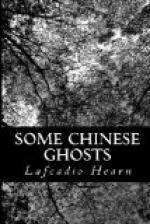Sometimes, again, even when the tints had not changed, after the pricked and labored surface had seemed about to quicken in the heat, to assume the vibratility of living skin,—even at the last hour all the labor of the workers proved to have been wasted; for the fickle substance rebelled against their efforts, producing only crinklings grotesque as those upon the rind of a withered fruit, or granulations like those upon the skin of a dead bird from which the feathers have been rudely plucked. And Pu wept, and cried out unto the Spirit of the Furnace: “O thou Spirit of Flame, how shall I be able to imitate the thrill of flesh touched by a Thought, unless thou wilt vouchsafe to lend me thine aid?”
And the Spirit of the Furnace mysteriously answered him with muttering of fire: “Canst thou give ghost unto a stone? Canst thou thrill with a Thought the entrails of the granite hills?”
Sometimes it was found that all the work indeed had not failed; for the color seemed good, and all faultless the matter of the vase appeared to be, having neither crack nor wrinkling nor crinkling; but the pliant softness of warm skin did not meet the eye; the flesh-tinted surface offered only the harsh aspect and hard glimmer of metal. All their exquisite toil to mock the pulpiness of sentient substance had left no trace; had been brought to nought by the breath of the furnace. And Pu, in his despair, shrieked to the Spirit of the Furnace: “O thou merciless divinity! O thou most pitiless god!—thou whom I have worshipped with ten thousand sacrifices!—for what fault hast thou abandoned me? for what error hast thou forsaken me? How may I, most wretched of men! ever render the aspect of flesh made to creep with the utterance of a Word, sentient to the titillation of a Thought, if thou wilt not aid me?”
And the Spirit of the Furnace made answer unto him with roaring of fire: “Canst thou divide a Soul? Nay!... Thy life for the life of thy work!—thy soul for the soul of thy Vase!”
And hearing these words Pu arose with a terrible resolve swelling at his heart, and made ready for the last and fiftieth time to fashion his work for the oven.
One hundred times did he sift the clay and the quartz, the kao-ling and the tun; one hundred times did he purify them in clearest water; one hundred times with tireless hands did he knead the creamy paste, mingling it at last with colors known only to himself. Then was the vase shapen and reshapen, and touched and retouched by the hands of Pu, until its blandness seemed to live, until it appeared to quiver and to palpitate, as with vitality from within, as with the quiver of rounded muscle undulating beneath the integument. For the hues of life were upon it and infiltrated throughout its innermost substance, imitating the carnation of blood-bright tissue, and the reticulated purple of the veins; and over all was laid the envelope of sun-colored Pe-kia-ho, the lucid and glossy enamel, half diaphanous, even like the substance that it counterfeited,—the polished skin of a woman. Never since the making of the world had any work comparable to this been wrought by the skill of man.




